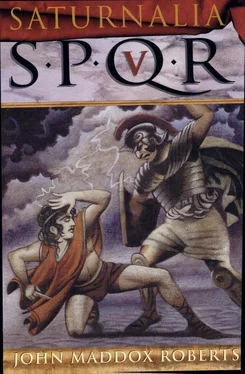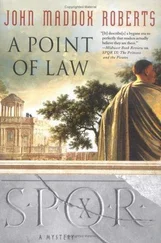John Roberts - Saturnalia
Здесь есть возможность читать онлайн «John Roberts - Saturnalia» весь текст электронной книги совершенно бесплатно (целиком полную версию без сокращений). В некоторых случаях можно слушать аудио, скачать через торрент в формате fb2 и присутствует краткое содержание. Год выпуска: 0101, ISBN: 0101, Издательство: St. Martin, Жанр: Исторический детектив, на английском языке. Описание произведения, (предисловие) а так же отзывы посетителей доступны на портале библиотеки ЛибКат.
- Название:Saturnalia
- Автор:
- Издательство:St. Martin
- Жанр:
- Год:0101
- ISBN:9780312320188
- Рейтинг книги:4 / 5. Голосов: 1
-
Избранное:Добавить в избранное
- Отзывы:
-
Ваша оценка:
- 80
- 1
- 2
- 3
- 4
- 5
Saturnalia: краткое содержание, описание и аннотация
Предлагаем к чтению аннотацию, описание, краткое содержание или предисловие (зависит от того, что написал сам автор книги «Saturnalia»). Если вы не нашли необходимую информацию о книге — напишите в комментариях, мы постараемся отыскать её.
Saturnalia — читать онлайн бесплатно полную книгу (весь текст) целиком
Ниже представлен текст книги, разбитый по страницам. Система сохранения места последней прочитанной страницы, позволяет с удобством читать онлайн бесплатно книгу «Saturnalia», без необходимости каждый раз заново искать на чём Вы остановились. Поставьте закладку, и сможете в любой момент перейти на страницу, на которой закончили чтение.
Интервал:
Закладка:
“It may have been a strenuous task,” I told him, “but I’m relieved to hear that it’s settled. The business dragged on far too long.”
“Largely because of our hostess’s late husband,” Crassus grumbled, taking a goblet from the table, “though I shouldn’t say so under his own roof.”
“He was an obstinate man,” I admitted. “But he wasn’t obstructing Pompey single-handed.”
“He nearly was, last year.”
“Was it that bad?” I asked.
“Didn’t you hear? But I suppose most of the information you got was from your family. They probably spared you the embarrassing details. First, he got in trouble with the moneylenders by continuing to uphold Lucullus’s remission of the Asian tax debt. He fought tooth and nail against Clodius’s transfer to the plebs. The infighting got extremely nasty and personal, especially since they were in-laws. Then, to cap it off, he attacked the tribune Flavius over yet another agrarian law to provide land for Pompey’s troops. It got so openly violent that Flavius charged him with violation of tribunician immunity and had him haled to prison!”
“Prison! A serving consul!” This was bizarre even for our sort of politics.
“Well, it was only for an hour or two. There was a lot of argument whether the sacrosanctity of the the tribuneship overrode the constitutional immunity of the consulship. Caesar was called in to rule on it as pontifex maximus.”
“Incredible,” I mumbled into my wine. “They must’ve been lining up to poison him.”
“Eh? What’s that you say, Decius?”
But we were interrupted by Clodia hauling in her latest prize. He was a splendid-looking young man who seemed vaguely familiar to me. He was somewhat flushed with wine, and he had a smile as dazzling as Milo’s.
“Sometimes,” Clodia announced, “I invite someone just for being wellborn and handsome. This is Marcus Antonius, the son of Antonius Creticus and nephew of Hibrida.”
“My greetings to you all,” the boy said, gesturing like a trained actor and amazingly assured for one so young. Now I thought I remembered him.
“Didn’t we meet at the time of Lucullus’s triumph?” I asked.
“Did we? Then I am doubly honored to meet you again, Senator.”
“Decius Metellus,” Clodia told him.
“Ah, the famous Decius Metellus!” I could see that he had no idea who I was, but he was one of those rare people who could make you like them even when they were being rude.
“Got a military tribuneship for next year didn’t you, Antonius?” Crassus said.
“Yes, and I’ll be joining the staff of Balbus in Asia. I wish I could have gotten attached to Caesar in Gaul, but all the other candidates were senior to me and they were all clamoring for Gaul.”
“You’ll have your chance,” Crassus assured him. “That’s going to be a long war in Gaul.”
Dinner was announced and we took our places on the couches. Hermes took my toga and sandals and hurried upstairs, where all the slaves not attending in the triclinium or the kitchen were banished for the duration. There were the usual nine at dinner, although Clodia never felt bound to honor the old custom. It was probably just coincidence. I have named six others besides myself, and I no longer remember who the other two were. Parasites, I suppose, probably poets. Clodia had a fondness for poets.
I was on the right-hand couch, with Clodia to my left and Vatinius to my right. As highest in rank, Crassus had the honorary “consul’s place” on the right of the central couch, with Bestia and one of the poets. The other couch held Antonius, Fulvia, and the other poet. Clodia and Fulvia flopped right down on the couches alongside the men, flouting yet another convention. This time, I approved. I would always rather share a couch with a beautiful woman than an ugly man. Or a handsome one, for that matter.
The food was wonderful. Clodia had better taste than most, and while her spread was lavish and included rare viands and spices, she never indulged in the vulgar extravagance flouted by the newly rich. Her wines were the best and nobody seemed to be keeling over from the effects of poison.
The serving slaves were another matter. Like the janitor they were exceptional beauties, and like him, they were minimally clad, only ornamented here and there with jewelery and sporting Clodia’s specialty: the jeweled neck ring. As a further exotic refinement, they were all of differing races. The wine server was an Arab boy with enormous brown eyes. Towels were passed by a tawny-skinned Asian girl. The carver was a muscular Gaul, who wielded a pair of curved knives with incredible dexterity. The main courses were borne in on platters by southerners who came in gradations of ever darker skin: the eggs were brought in by a pale-brown Mauritanian, the fish by a slightly darker Numidian, the meats by a deep-brown Nubian, and the sweets by a soot-black Ethiopian.
The music, on the other hand, was provided by a small ensemble of albinos, their extraordinary skin like polished, blue-veined marble and their cascading hair like sea foam. Unlike the others these wore gauzy blindfolds that allowed them some vision. I presumed the reason for this oddity was that Clodia disliked their reddish eyes.
In such a company the talk, naturally, was of politics and war and foreign affairs. This was not one of Clodia’s artistic gatherings, so the two parasites kept quiet, grateful for a free meal and the radiance of their distinguished betters. The conversation stayed light while we stuffed ourselves, but with the after-dinner wine we got back to the one thing everyone really cared about. The legislations of the year that was ending were discussed, especially the amazing number of new laws rammed through by Caesar (most of them excellent and long-needed, although it pains me to admit it).
Crassus, to whom all deferred, reeled them off, counting ostentatiously on his fingers like a a fishwife totting up the price of a basket of mullets. Crassus had an excellent memory and a politician’s grasp of the relative importance of everything.
“First and most important, he passed his Agrarian Law, using public money to buy up the state lands in Campania and distribute them among twenty thousand of Pompey’s veterans and a few thousand of the urban poor, to ease the overcrowding of the city. The Senate balked at that one. Decius, you should have heard Cato bray!”
“I’m not surprised,” I said. “We’ve called it ‘public land,’ but the senatorial families have been leasing them at almost no cost for generations.”
“Including yours, Decius,” Clodia said.
“Including mine,” I acknowledged.
“Well,” Crassus continued, “there was Cato, railing and foaming at the mouth for almost an entire day, until Caesar threatened him with arrest.”
“Cato is a tiresome man,” Antonius said. Fulvia had moved closer to him than would have been deemed decent in any other household.
“That he is,” Crassus agreed. “Anyway, by next day the crowd was so big the assembly had to be held in front of the Temple of Castor, with Caesar reading off his new law from the steps. Pompey and I were there backing him, naturally, neither of us serving in any capacity but adding a little much-needed weight to Caesar’s side of the balance.
“Then Bibulus threw in his tame tribunes: Ancharius, Fannius, and Domitius Calvinus, to interpose their veto. The crowd grabbed the fasces away from Bibulus’s lictors, broke the rods, and used them to beat the tribunes. How can tribunes claim to represent the people when the people themselves rebel against them? Anyway, that was when Bibulus stormed off to his house and said he was watching for omens. He even said he was going to sanctify the whole rest of the year, so no official business could be transacted!” This raised a general laugh.
Читать дальшеИнтервал:
Закладка:
Похожие книги на «Saturnalia»
Представляем Вашему вниманию похожие книги на «Saturnalia» списком для выбора. Мы отобрали схожую по названию и смыслу литературу в надежде предоставить читателям больше вариантов отыскать новые, интересные, ещё непрочитанные произведения.
Обсуждение, отзывы о книге «Saturnalia» и просто собственные мнения читателей. Оставьте ваши комментарии, напишите, что Вы думаете о произведении, его смысле или главных героях. Укажите что конкретно понравилось, а что нет, и почему Вы так считаете.









